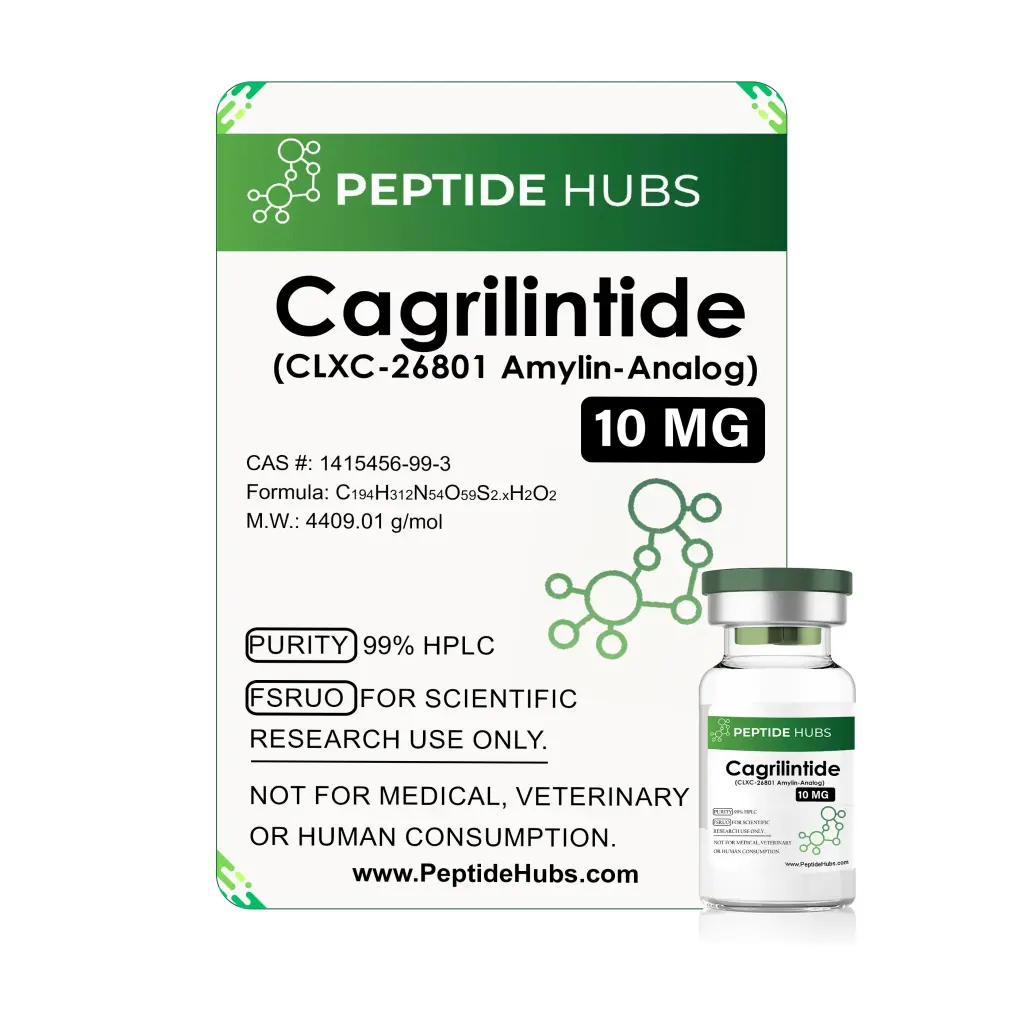
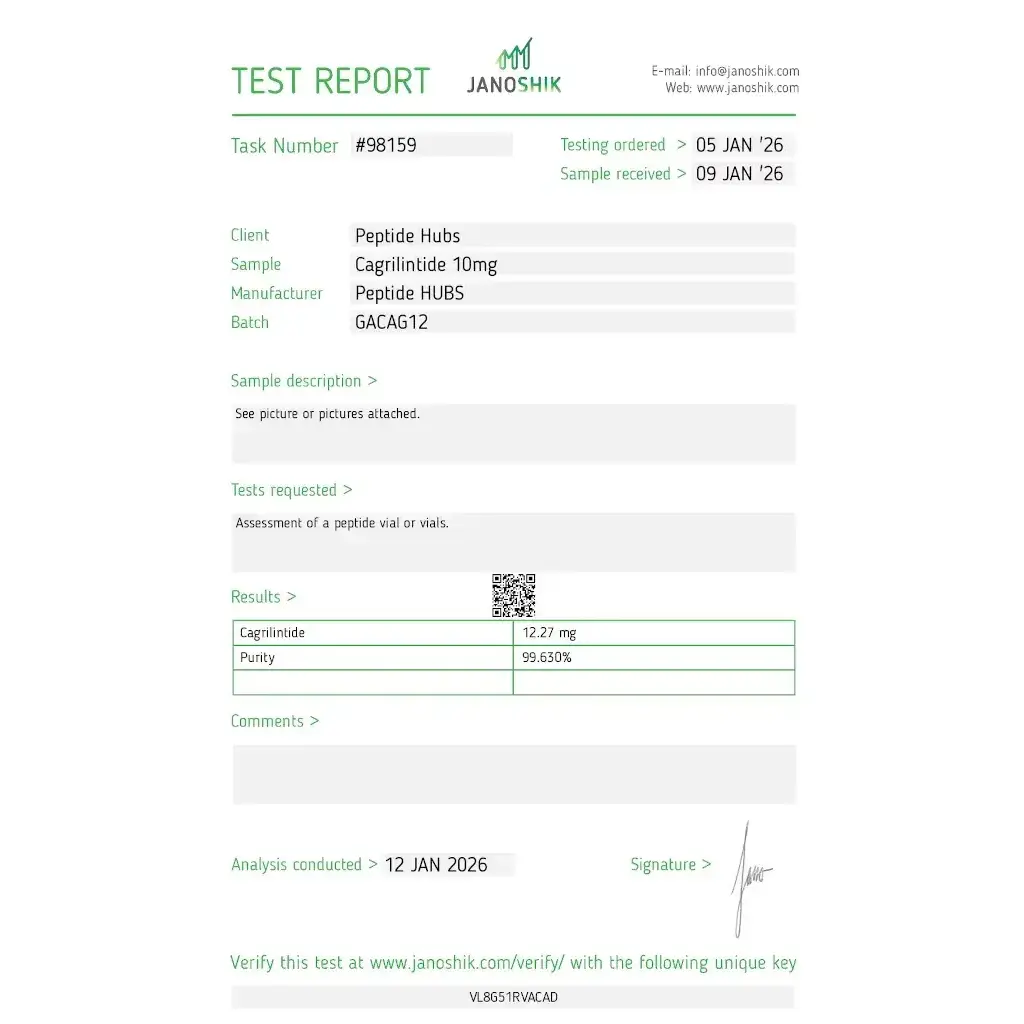


Classification: Synthetic Amylin Analog
Active substance: Cagrilintide
Manufacturer: Peptide Hubs
Form/Strength: Lyophilized Powder / 10 mg per vial
Pack size: 2 mL Sterile Vial
Route: Subcutaneous Injection (after reconstitution)
Lab Tested: Check Lab Test Result
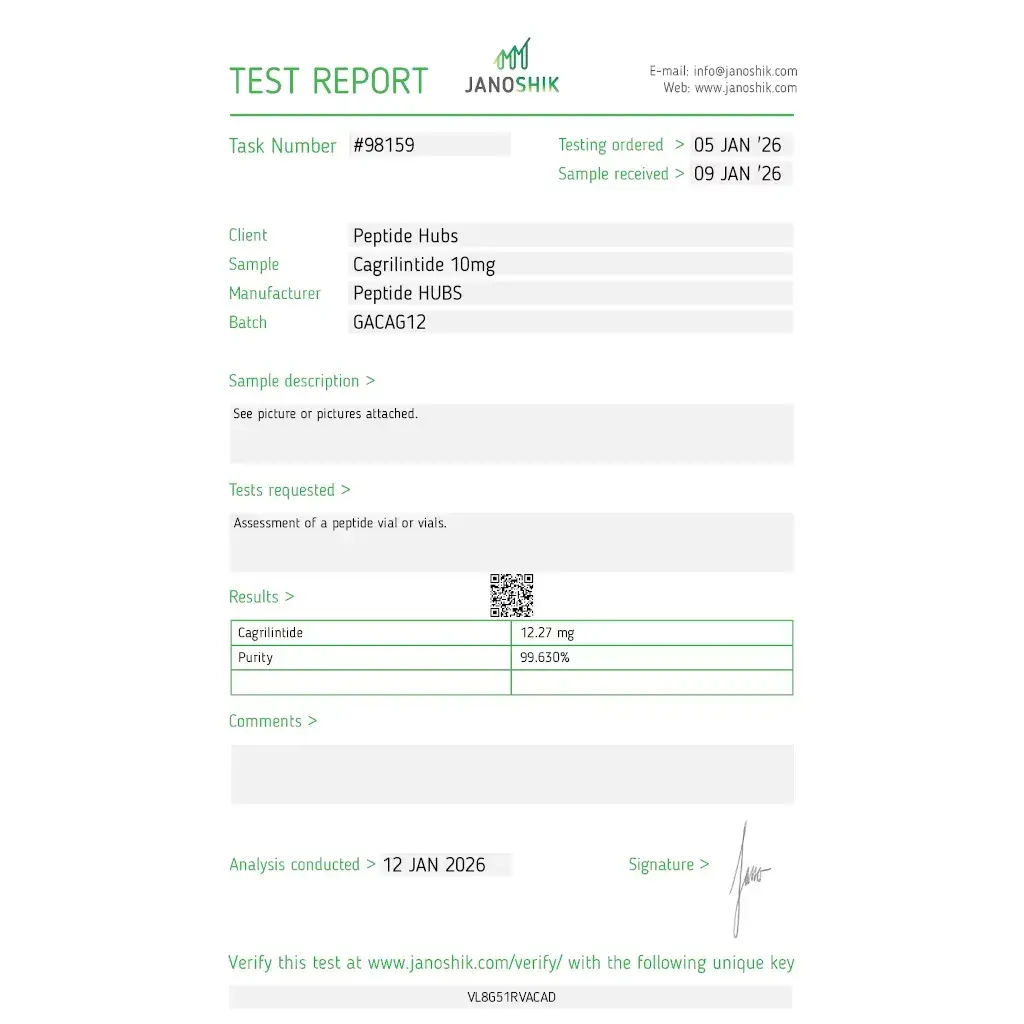
Peptide Hubs is at the forefront of research compound innovation with our high-purity Cagrilintide. This groundbreaking synthetic amylin analog represents a significant leap forward in the study of weight management and metabolic function. Sourced from the latest pharmaceutical research, our 10mg vials of lyophilized powder are manufactured in a cGMP-compliant facility in the USA, ensuring unmatched quality and consistency for serious researchers. For those seeking a Real Cagrilintide from Peptide Hubs, our commitment to purity and transparency sets us apart.
Cagrilintide is a long-acting amylin analog. Amylin is a peptide hormone that is co-secreted with insulin by the beta-cells of the pancreas in response to food intake. Cagrilintide has been engineered to mimic the effects of natural amylin but with a significantly extended half-life, allowing for sustained activity and once-daily dosing in research settings. Its primary functions are to reduce appetite, slow gastric emptying, and inhibit the secretion of glucagon, making it a powerful subject for metabolic studies.
Cagrilintide works primarily by binding to and activating amylin receptors in the brain, specifically in the area postrema and nucleus tractus solitarius, regions known to regulate appetite and energy expenditure. According to a pivotal study published in The Lancet, cagrilintide demonstrated dose-dependent weight loss in clinical trials, highlighting its potent efficacy.
Key research effects of Cagrilintide include:
Important: This information is for research purposes only. All dosages discussed are based on common research parameters and are not medical advice.
Cagrilintide is reconstituted with Bacteriostatic Water and administered via subcutaneous injection. Due to its potency, dosing must be approached methodically. Research often begins with a very low dose (e.g., 0.1-0.2 mg) to assess tolerance. The dose is then gradually titrated upwards over several weeks to a standard research dose ranging from 1.0 mg to 4.5 mg, administered once daily. The 10mg vial provides a substantial supply for long-term research cycles. Injection sites should be rotated (abdomen, thigh).
Cagrilintide's powerful appetite-suppressing effects make it a cornerstone for any cutting or weight management research stack. It can be effectively combined with other compounds that enhance fat loss through different mechanisms.
Effective research stacks include:
The side effect profile of Cagrilintide is primarily gastrointestinal, which is common among appetite-suppressing peptides. These effects are often dose-dependent and tend to subside as the research subject adapts.
Commonly observed effects in research include:
Starting with a low dose and gradually titrating upwards is the best strategy to mitigate these gastrointestinal side effects. Ensuring adequate hydration is also crucial. As with any research compound, sourcing from a reputable supplier like Peptide Hubs is essential to avoid risks associated with impurities or incorrect dosing.
Researching a novel compound like Cagrilintide demands the highest level of quality assurance. Peptide Hubs delivers precisely that. Our product is synthesized to the highest standards, and every batch is subjected to rigorous third-party testing to verify identity, purity (>99%), and peptide content. We provide transparent access to these lab reports, ensuring you know exactly what you are administering. Coupled with our secure USA shipping and dedicated customer support, Peptide Hubs is the definitive source for advanced research compounds.
While all are used for weight management research, they work on different pathways. Semaglutide and Liraglutide are GLP-1 receptor agonists, primarily stimulating insulin secretion and promoting satiety. Cagrilintide is an amylin analog, which also promotes satiety but does so by slowing gastric emptying and suppressing glucagon. They can have synergistic effects when researched together.
Cagrilintide has an extended half-life of approximately 6-8 days. This is significantly longer than natural amylin. This extended half-life allows for stable plasma concentration and once-weekly dosing in many clinical protocols, making it a very convenient compound for long-term research into chronic weight management.
Unlike insulin, Cagrilintide has a low risk of causing hypoglycemia on its own. Its action suppresses glucagon (which raises blood sugar) and slows food absorption, which actually helps prevent sharp spikes and crashes in blood glucose. However, researchers should be cautious when stacking it with other compounds that affect blood sugar, such as insulin or diabetes medications.
A standard research protocol involves starting with a very low dose (e.g., 0.1-0.2 mg) once weekly. After 1-2 weeks, the dose can be increased by 0.1-0.2 mg increments based on tolerance and observed effects. This gradual titration is critical for minimizing gastrointestinal side effects. A common maintenance dose in research ranges from 1.0 mg to 4.5 mg weekly.
As a newer compound, the longest clinical trials have extended for over a year, showing sustained efficacy and a manageable safety profile for that duration. For research purposes, long-term protocols are feasible, but it is always prudent to include monitoring periods to assess long-term effects on metabolic markers and overall health.
Please log in to write Cagrilintide 10 mg review.
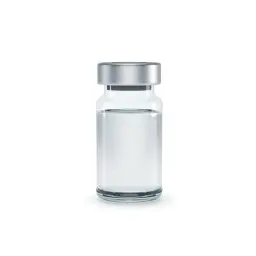
Classification: Glucagon-like peptide-1 (GLP-1) & Amylin Receptor Agonist
Active substance: Cagrilintide
Manufacturer: Stealth Labs
Form/Strength: Lyophilized Powder, 10 mg/vial
Pack size: 2 mL Vial
Route: Subcutaneous Injection
Lab Test: View Result
Shipped Without Label!

Classification: Research Peptide (Long-Acting Amylin Analog)
Active substance: Cagrilintide Acetate
Manufacturer: Dragon Pharma
Form/Strength: Lyophilized Powder, 10 mg/vial
Pack size: 2 mL Vial (Requires Reconstitution)
Route: Subcutaneous (SubQ) Injection
Lab Test: View Result
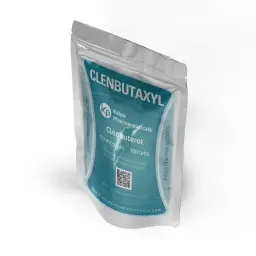
Classification: Beta-2 Adrenergic Agonist
Active substance: Clenbuterol Hydrochloride
Manufacturer: Kalpa Pharmaceuticals
Form/Strength: Tablet, 40 mcg/tablet
Pack size: 100 tablets
Route: Oral
Lab Test: View Result